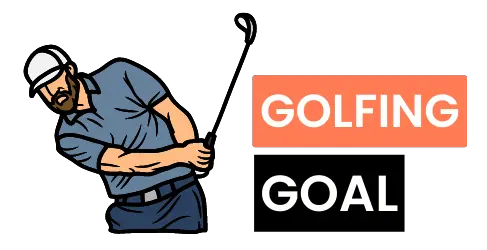Golf carts, once a mere utility on the course, have evolved into personalized expressions of style and individuality. But what if you want to rejuvenate your cart’s appearance without breaking the bank? Vinyl wrapping—a cost-effective and stylish solution.
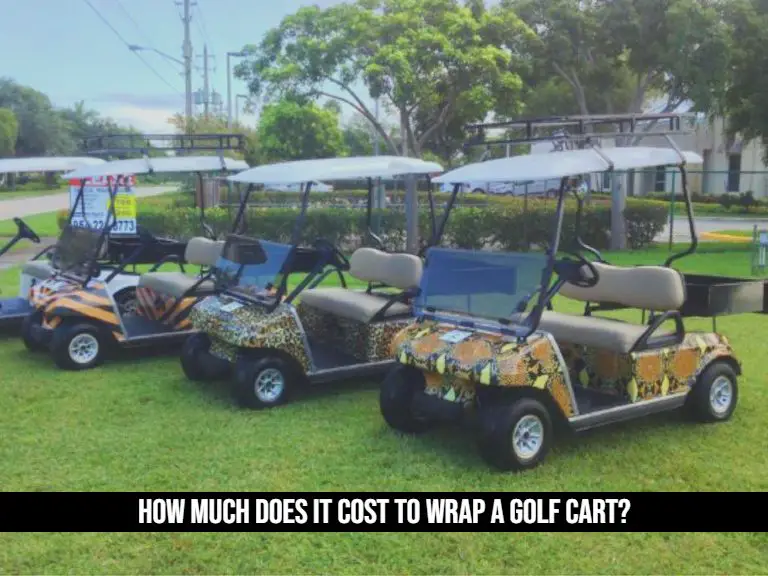
The cost to wrap a golf cart can range from $150 to $1000, depending on various factors like size, quality, and design.
No matter if you’re a recreational golfer looking to stand out or a club owner aiming to recondition a fleet, understanding the cost of wrapping a golf cart is essential.
In this guide, we’ll look at the factors that influence the price, offering you comprehensive insight to make budgeting easier.
Let’s unwrap the details! And if you’ve ever wondered why golf carts can be so pricey in the first place, our article Why Are Golf Carts So Expensive? sheds light on that aspect.
Why Install a Golf Cart Wrap?
Benefits of Installing a Golf Cart Wrap
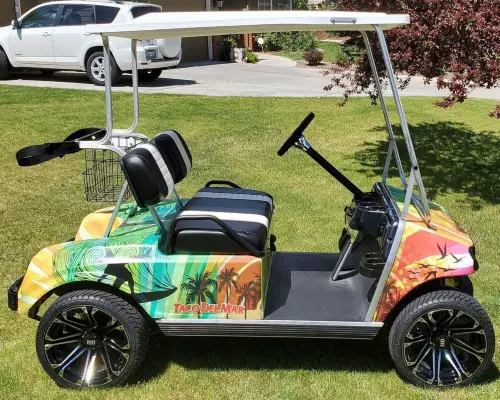
Protection Against Damage – Wrapping a golf cart provides a high level of protection against wear and tear, ensuring that the cart remains in great shape for an extended period.
Cost-Effective – Compared to painting, wrapping is generally more affordable. A quality paint job can be expensive, while wraps offer a similar level of protection and aesthetic appeal at a fraction of the cost.
Immediate Use – Once the wrap is applied, there’s no waiting time. Unlike paint, which requires drying, you can immediately use your golf cart after wrapping.
Customization – Wraps allow for a high degree of personalization. Whether you prefer standard patterns, licensed sports team designs, camouflage, or even branding with logos, the options are vast.
Durability – A standard paint job can last up to 10 years with quality paint. In comparison, a typical vinyl wrap, which is commonly used for golf carts, can last 6-7 years, depending on maintenance and environmental factors.
Boost in Resale Value –.Wrapping not only protects your golf cart but also enhances its aesthetic appeal. This dual benefit can significantly increase the cart’s resale value. Potential buyers often appreciate a well-maintained and uniquely designed golf cart, making your wrapped cart a more attractive purchase.
Understanding the Cost to Wrap a Golf Cart: Price Breakdown!
Average Cost of Golf Cart Wraps
The cost to wrap a golf cart varies based on its size and the type of wrap chosen:
- A four-seat golf cart (Vinyl/Printed): $200 to $350
- A two-seat golf cart (Vinyl/Printed): $150 to $250
Different Types of Wraps
1. Standard Patterns (Vinyl) – These are the most basic and commonly chosen wraps. They include designs like tie-dye, checks, and other generic patterns.
- Cost: Typically on the lower end of the price range, starting from $150 for two-seaters.
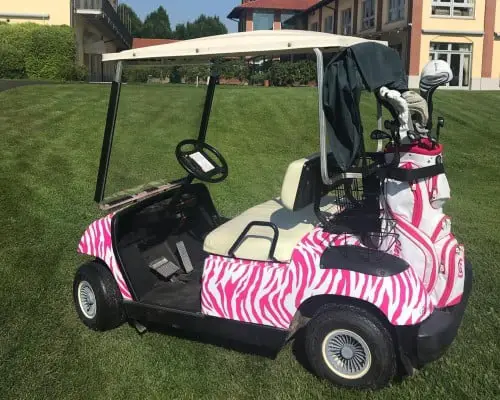
3. Licensed Sports Teams Wraps (Printed) – For sports enthusiasts, these wraps feature logos and designs of various sports teams.
- Cost: These are often pricier due to licensing fees, potentially reaching up to $350 for four-seaters.
4. Camouflage Wraps (Vinyl/Printed) – These come in both licensed and non-licensed brands. Ideal for those who prefer a rugged or outdoor look.
- Cost: Non-licensed versions are more affordable, while licensed brands can be more expensive about 350-500$
5. Retail and Grocery Brands with Logos (Printed) – For those looking to advertise or showcase a particular brand on their golf cart.
- Cost: Depending on the brand and licensing requirements, these can be on the higher end of the price spectrum (450-800$).
Factors That Affect the Price of Golf Cart Wrapping
Wrapping a golf cart is a popular customization option that allows owners to personalize their carts and protect them from wear and tear. The cost of wrapping a golf cart can vary based on several factors. Here’s a breakdown of the primary factors that influence the price:
1. Size of the Golf Cart
Larger golf carts require more material for wrapping, leading to higher costs. For instance, a four-seat golf cart will typically cost more to wrap than a two-seat golf cart.
2. Design Complexity
Custom designs or intricate patterns can be more labor-intensive and may require specialized printing, increasing the overall cost. Licensed sports teams or branded designs might also come at a premium due to licensing fees.
3. Type of Wrap
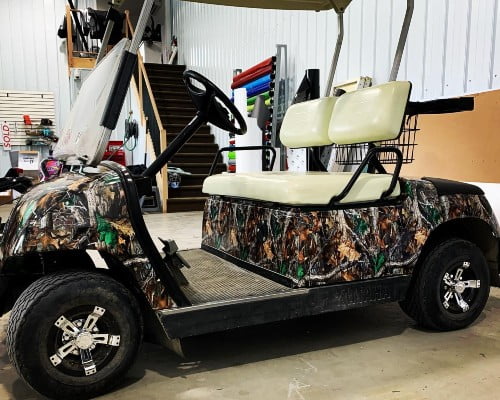
There are different types of wraps available, from standard patterns like tie-dye to licensed designs such as sports teams or retail brands. Licensed or branded wraps often cost more due to the need for permissions and royalties.
Moreover, some wrap patterns may cost more, and brands like 3M, Avery Dennison, and Oracal might have different pricing.
4. Brand of Vinyl
Premium brands or specialized vinyl types might be more expensive than generic or bulk-purchased vinyl.
5. Installation Time
If the installation process is intricate or requires more time, labor costs will increase. This can be influenced by the design complexity and the expertise of the installer.
6. Additional Design Elements
Elements like color, logo placement, textures, and other design specifics can influence the price. For example, using a specific logo or brand might increase the cost due to licensing.
7. Market Costs
External factors such as market demand, availability of materials, and economic conditions can also play a role in determining the cost of golf cart wraps.
8. Personal Preferences
Individual choices, such as specific colors, textures, or unique customizations, can influence the cost. Personalized designs or preferences that deviate from standard options might require additional time, materials, or expertise, leading to a higher price.
9. Partial or Full Wrap
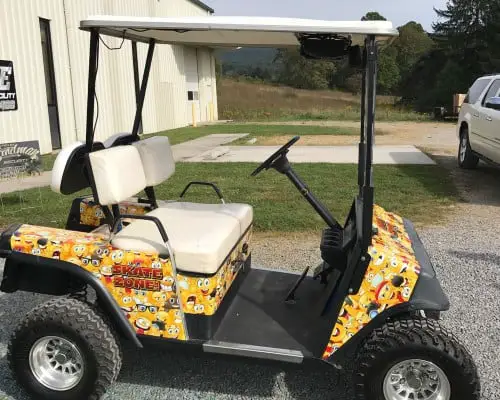
It’s your decision whether you want a partial or full wrap for your golf cart. A partial wrap covers specific parts of the golf cart, while a full wrap covers the entire exterior. Naturally, a full wrap will be more expensive due to the larger amount of material used and the increased labor required.
Tips! (If you’re wrapping for protective reasons, a full wrap offers more comprehensive coverage. For branding or advertising purposes, a partial wrap might suffice, focusing on key visible areas).
How Cart Brand Can Influence the Wrapping Cost?
1. Club Car
- Wrap Types – Club Car is known for its fully customizable carts, which often require specialized wraps. These wraps can range from sleek metallic finishes to intricate patterns or even custom artwork.
- Cost Influence – Given the customization level, wraps for Club Car can be on the pricier side, ranging from $250 to $500. The unique body shape and design features might require more detailed work, increasing labor costs.
2. E-Z-GO
- Wrap Types – E-Z-GO carts feature a user-friendly design, making it easier to apply standard wraps. Popular choices include matte finishes, simple patterns, and basic color schemes.
- Cost Influence – The straightforward design of E-Z-GO carts typically means less labor-intensive wrapping, translating to more affordable costs, around $225 to $450.
3. Yamaha
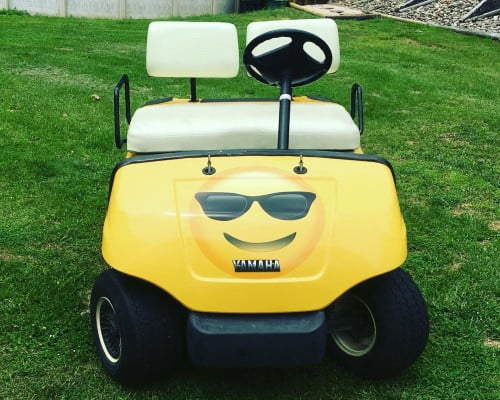
- Wrap Types – Yamaha carts are popular for their budget-friendly nature. Wraps for these carts often include basic designs, but they can also accommodate more elaborate patterns or branding.
- Cost Influence – Yamaha’s versatile design allows for a wide range of wrap options, from budget-friendly choices around $225 to more premium designs up to $500, giving owners flexibility in cost.
4. Garia
- Wrap Types – As a luxury golf cart brand, Garia carts often feature premium wraps. These can include high-gloss finishes, luxury patterns, or even leather or wood grain textures.
- Cost Influence – The premium nature of Garia carts means that wraps are typically more expensive, ranging from $550 to $800. The materials used are of higher quality, and the installation process might be more intricate.
5. Polaris
- Wrap Types – Polaris carts are designed for eco-friendly and stylish looks. Wraps for these carts can be pricier and include eco-friendly materials, vibrant patterns, and modern designs.
- Cost Influence – The emphasis on eco-friendliness can increase the cost of wraps for Polaris carts to around $500 to $750. Additionally, the modern design might require specialized wrapping techniques, adding to the cost.
Closing Thoughts!
Golf cart wrapping has emerged as a sustainable and cost-effective alternative to traditional painting, offering both aesthetic and protective benefits.
While the costs can vary based on factors like cart size, design complexity, and brand preferences, wrapping provides a unique opportunity for personal expression and customization.
Not only does it shield the cart from environmental wear and tear, but it also enhances its resale value. For those seeking a blend of functionality and style without a hefty price tag, wrapping stands out as the optimal choice.
In essence, wrapping a golf cart is an investment in its longevity, appearance, and overall value, making it a worthwhile consideration for every golf cart owner.
FAQs
Is it cheaper to wrap or paint a golf cart?
Wrapping a golf cart typically costs between $150 to $350, depending on the size and design. In contrast, a quality paint job for a golf cart can range from $500 to $1,500 or more, based on the complexity of the design and the quality of the paint used. Therefore, wrapping is generally a more cost-effective option compared to painting.
How Do You Remove A Golf Cart Wrap?
To remove a golf cart wrap:
1. Use a heat gun or hair dryer to gently warm up the vinyl material, making it more pliable.
2. Start peeling the wrap from one corner, pulling it back slowly and evenly to avoid tearing.
3. As you peel, continue to apply heat, especially if the vinyl becomes resistant.
4. Once the wrap is removed, clean off any adhesive residue using a solvent like rubbing alcohol or an adhesive remover.
5. Wipe the surface clean, ensuring all residues are removed before applying a new wrap or leaving the cart’s surface bare.

Bob is a golf equipment expert with a wealth of knowledge about the latest and greatest golfing gear. Bob is our Lead Product Reviewer and provides in-depth reviews and recommendations on the best equipment for golfers of all levels. He takes a hands-on approach to testing, using his extensive experience on the course to provide the most accurate and reliable product recommendations. Join Our Team!
